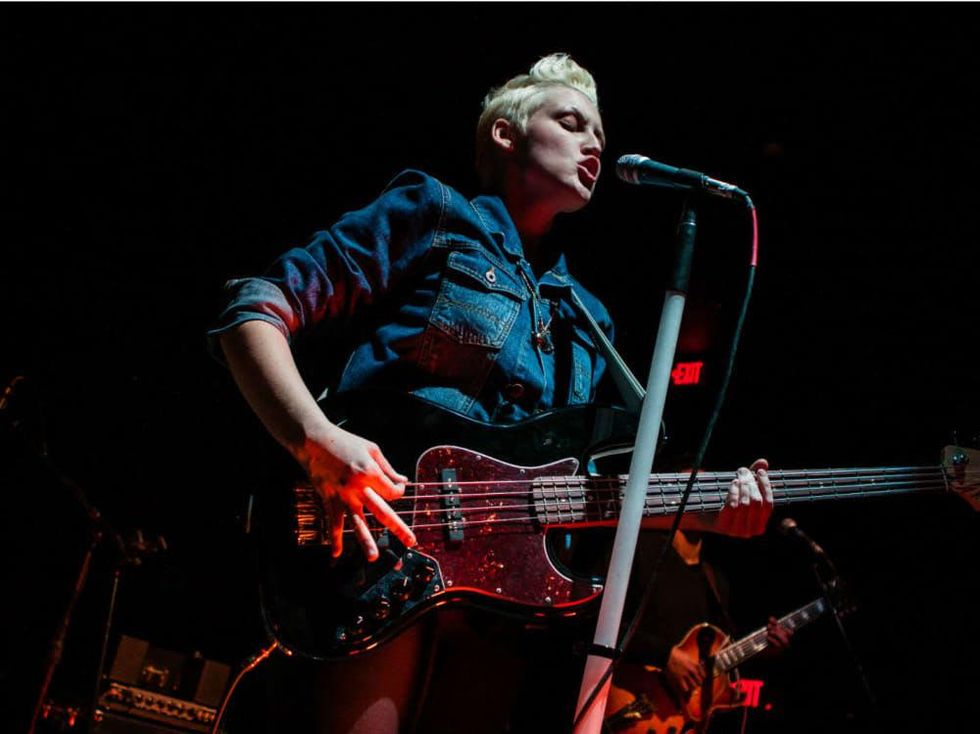Dallas Folkie Turned Rock Star
Local songstress Sarah Jaffe graduates to rock goddess with new album
Denton’s Sarah Jaffe began as a teen folk songstress. Now she is a full-grown rock goddess, thanks to the release of her stunning, painfully vulnerable new record, Don’t Disconnect, produced by Midlake drummer McKenzie Smith.
Few artists, especially ones who achieve even a modicum of acclaim, can successfully morph from the specific style of their beginning times into a category that’s terribly hard to categorize. But somehow Jaffe has done just that, and she’s done it with an enlightening flair.
The electronic and dance-inflected music she makes now shares a raw-boned, powerfully emotive tone with early, more acoustic-based favorites such as “Clementine” — but not much else. And, to a large extent, the subject matter and the array of styles gives us a musical timeline into Jaffe the person’s own psyche and innermost demons.
That’s what makes the evolution of Jaffe the artist so striking. When listened to in successive order, her records display an immense collection of personal writing and struggle. Begin with her Even Born Again EP from 2008, then listen to the folk-favorite Suburban Nature, which was her 2010 full-length debut. Continue on to 2012’s electro-pop The Body Wins; then pop in this new album, the stellar Don’t Disconnect.
Such an exercise will be rewarding, as it’s easy to feel like you’re listening to her grow as an individual at least as much as she has as an artist.
In anticipation of her upcoming show at the Majestic, we spoke with Jaffe about where she’s at in her life these days. Things are indeed promising, as she’s already garnered raves from the likes of Rolling Stone, NPR and even Eminem, who included her voice on a track from his latest album.
CultureMap: With your last album, The Body Wins, you had to overcome a serious case of writer’s block. Did you have any such issues this time around?
Sarah Jaffe: Yes and no. I actually went to Marfa last August for a couple of weeks with the intention of writing for this record, and I really battled with myself and some writer’s block for a bit. But I do know myself better now, and I know my capabilities and what I need to accomplish.
I can get frustrated, but I found out that being around other people in the studio with creative energies was really helpful, especially with McKenzie [Smith]. I thrived off having other people play different parts of songs and having light bulbs go on in my head. That really helped get me past any writer’s block.
CM: So the trip to Marfa didn’t help?
SJ: That trip was great, really. I did end up coming up with parts when I was out there, which show up on the record, like on “Lover Girl,” for example. Looking back on the trip now, it was totally necessary, though there were some minor meltdowns where I questioned, “Will I get past this?”
But I realized out there that [writing songs] is my job, and I simply had to get past it.
CM: When you first began, you were basically a folk singer-songwriter. You’re a much more versatile artist now that you’ve had a chance to try different styles. It seems as though your fan base is pretty cool with the changes.
SJ: They have been. There’s always going to be the people that only want to hear [Jaffe’s debut LP] Suburban Nature, and I get that, because people get attached to things they like. But as a songwriter, I’ve never listened to a record and thought to myself, “I like this record, so I want my next record to sound like this.”
For me to move on and grow, I need to create something new. I’ve grown a lot in the past 10 years, and I’ve learned so much from other musicians, so I never want to sound like one specific thing. I indulge in just about every kind of pop music, so it’s impossible for me to not change, I think.
CM: Are you surprised your audience has grown in size even though your style has changed so drastically?
SJ: The Denton and Dallas crowds have been so great and supportive, and that’s given me the confidence to stretch a bit. I think that support has been a key thing for me and my band members to have. It’s great to have that supportive hometown backbone.
CM: Artists often use different producers for different albums, but your change in producer is notable because you went from one locally based, highly regarded musician (John Congleton) and producer to another locally based, highly regarded musician and producer (McKenzie Smith). How did that come about?
SJ: John [Congleton] is one of my heroes, and I continue to learn from him. But, when I recorded “Satire” and “Defense” with McKenzie a full year before the other songs on the record were recorded, it was an experiment that just went really well. It was like butter, and it just worked and the energy was just great.
He and I have the same sense of humor and we’re great friends, so we decided to do the whole record together.
CM: You mentioned “Defense,” which is one of the more emotionally charged songs from the album. Had you just come off a tough time romantically or in some other way when you wrote that?
SJ: Sort of. I mean, I’m a combative person by nature, and as I’ve grown older I’ve tried to harness that. But I was at a point in my life, quite literally, where I was getting into fights pretty constantly.
Whether it was in one of my personal relationships or just in a bar, I was defensively getting into fights, and it snowballed over time. I finally got to a point where I was like, “What the hell is going on with me?” I was angry quite often, and I decided to stay home for a while, and that song came from that time.
It’s a very matter-of-fact song, and I think it comes off as self-explanatory in that way.
CM: Do you feel like you’ve harnessed your combative nature for the better completely?
SJ: I’m in my late 20s now, and I know that I can’t react immediately to everything. Sometimes, my knee-jerk reaction is to be defensive or get angry quickly, so I’ve been harnessing that energy into just being a better person.
I don’t know if being an Aquarius has anything to do with it [laughing], but I am a pretty impulsive person.



